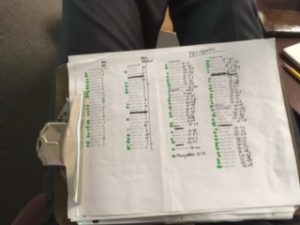This is a simple pop-up debate activity meant to:
- support the development of expectancy-value academic mindsets
- reinvigorate pop-up debates if/when they become stale
- deepen students' understanding of Fulkersonian argument (i.e., collaborative, argumentative discussion)
- give students a chance to practice Palmer's PVLEGS
Also, it doesn't need to take long (doable in 20 minutes for a 30-student class), as there is minimal prep.
Debate question
Which core subject area — math, science, social studies, or English language arts — is the best?
Work leading up to the debate
Introducing/practicing PVLEGS for speaking delivery: I held this debate the Monday before Thanksgiving break. In the debate that preceded this one, I introduced students to PVLEGS (we took notes on the acronym) and had them identify and work to improve a PVLEGS weakness. For this debate, I had students again identify a component of PVLEGS they wanted to work on, sharing that target with their partner in a quick Think-Pair-Share.
Reteaching the skill of paraphrasing: I shared with students that one reason our preceding pop-up debate had been flat was that we were silo-arguing — I stand up, say what I think, and then I sit down; you stand up, say what you think in isolation from what I've said, and then sit down; repeat 30 more times. I told them in this debate, I wanted to see them build on someone else's ideas using Paraphrase Plus.
Quickwrite in response to the debate question: Our writing warm-up for the class period was the debate question: Which core subject area — math, science, social studies, or English language arts — is the best? As usual, I require them to produce 100 words in their warm-up. (So old school, I know. I have a thing for volume.)
Ask for a volunteer to keep track of how many “votes” are placed for each core subject area: This person needed to participate in the debate like the rest of the kids, but was also tasked with “keeping score” on the board.
Set speaking limits: For this debate, I required a minimum of one speech per kid and a maximum of two speeches, with that maximum temporarily lifted at my discretion at any point in the debate.

Work during the debate
As the debate is happening, here's what I was doing:
Keeping track of who speaks and whether they use the target skill of paraphrasing: I use my trusty, high-tech clipboard for this. (See Figure 1.)
Interrupting to point out effective performances of various PVLEGS components or Fulkersonian moves, especially fair paraphrasing: These interruptions are quick and specific; I want to point out examples of the kind of skill I believe we are capable of.
Modeling argument and speech delivery with several arguments of my own: In this particular debate, I made impassioned arguments for the best-ness of both math and (when the tide had turned decisively against social studies) social studies.
Work after the debate
Reflection on what worked and what needs to improve: I prompted kids to do some post-debate analysis of our collective performance, using Think-Pair-Share to get the ideas flowing and (in Share mode) on the white board. This reflective piece is easy to miss, but it is an important step in placing the onus for good discussions on kids, not the teacher. For what it's worth, kids said this was their best pop-up debate of the year, and they cited the following reasons:
- relevant topic
- fewer silo arguments
- better speech delivery (thanks, PVLEGS)
Closing thoughts
I think it's easy to miss here that this debate has every kid arguing for the value of an academic subject. I was surprised to find students all across the spectrums of ability and motivation getting passionate about subject area they chose, and my hunch is that, in both the subject area of their choice and the subject areas they heard their peers argue for, students walked out of my room that day with increased notions of the value of school. I never try to trick students, but in a way this argument did end up tricking us all into examining the many reasons why school isn't as pointless as so many believe. Hopefully, this took us one more step down the path of becoming a group of people for whom achievement is normal.
Martin says
Is there a video of one of these debates?
Dave Stuart Jr. says
Martin, I don’t have a video of the expectancy value debate, unfortunately.